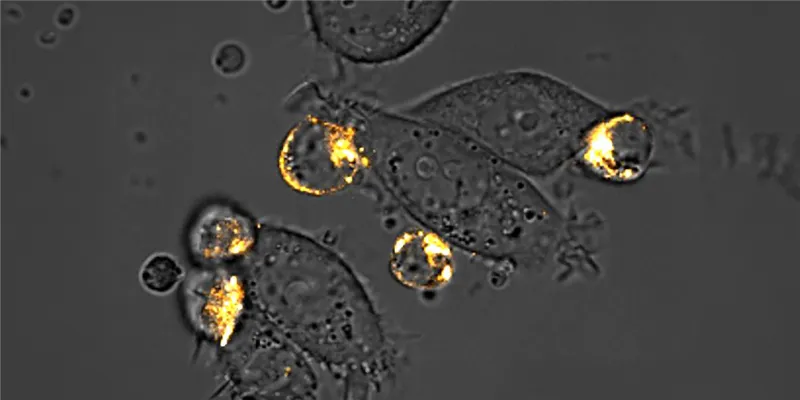Engineered Bacteria Direct T Cells to Combat Cancer for the First Time


ONCOLife |
14 October 2023
For the first time in the field of oncology, bio-engineers from Columbia University have introduced an innovative cancer therapy. This technique utilizes engineered bacteria to direct T cells toward eradicating solid tumors. By marking the tumors with synthetic targets created by the bacteria, they empower CAR-T cells to identify and eliminate cancerous cells.
In the study, synthetic biologists at Columbia Engineering, programmed bacteria to act as beacons, directing the actions of engineered T cells to target various solid tumors. This pioneering work introduces a unique interaction between these two "living" treatments, facilitating the targeting of various solid tumors. The method has the potential to treat a diverse range of solid tumors without requiring tumor-specific antigens, representing a significant breakthrough in cancer therapy.
Historically, chimeric antigen receptor (CAR) T cells have been employed to target antigens found on blood cells, proving effective in treating leukemia and lymphoma. However, solid tumors, such as those found in breast and colon cancers, have been challenging due to their complex cellular make-up.
These tumors often comprise cells displaying varied antigens, some of which are also found on healthy cells, complicating targeted treatments. But, the team at Columbia Engineering, led by Associate Professor of Biomedical Engineering, Tal Danino, has discovered a novel method to tackle this issue.
“Our probiotic platform enables CAR-T cells to attack a broad range of tumor types. Traditional CAR-T therapies have relied on targeting natural tumor antigens. This is the first example of pairing engineered T cells with engineered bacteria to deliver synthetic antigens safely, systemically, and effectively to solid tumors. This could have a significant impact on the treatment of many cancers. Overall, our ProCAR platform represents a new strategy for enhancing the effectiveness of CAR-T cell therapy in solid tumors. While we’re still in the research phase, it could open up new avenues for cancer therapy,” said Tal Danino.
By engineering tumor-colonizing bacteria, known as probiotics, they have been able to produce synthetic targets within tumors. These targets then guide CAR-T cells to the marked cancer cells, effectively "painting" the tumor. This approach essentially creates a universal CAR-T cell that attacks a general antigen, negating the need to identify a specific tumor antigen for each cancer type and patient.
Notably, this is the first instance where engineered probiotics have been paired with CAR-T cells. The result is the creation of a Probiotic-guided CAR-T cell (ProCAR) platform.
Initial studies have shown the platform to be both safe and effective across a range of human and mouse cancer models. The presence of the bacteria within the tumor has been found to further enhance the tumor-killing functions of human T cells.
While the research is still ongoing, Danino, who is also affiliated with the Herbert Irving Comprehensive Cancer Center and Data Science Institute, sees the ProCAR platform as a promising strategy for enhancing CAR-T cell therapy in solid tumors.
This revolutionary research, which forms part of a collaboration with the laboratory of Nicholas Arpaia at Columbia’s Vagelos College of Physicians and Surgeons, has opened up potential new avenues in cancer therapy. The team is looking forward to refining their work and commencing clinical trials to further evaluate the safety and efficacy of this platform in human patients.
Abstract of the research
Probiotic-guided CAR-T cells for solid tumor targeting
Abstract: A major challenge facing tumor-antigen targeting therapies such as chimeric antigen receptor (CAR)–T cells is the identification of suitable targets that are specifically and uniformly expressed on heterogeneous solid tumors. By contrast, certain species of bacteria selectively colonize immune-privileged tumor cores and can be engineered as antigen-independent platforms for therapeutic delivery. To bridge these approaches, we developed a platform of probiotic-guided CAR-T cells (ProCARs), in which tumor-colonizing probiotics release synthetic targets that label tumor tissue for CAR-mediated lysis in situ. This system demonstrated CAR-T cell activation and antigen-agnostic cell lysis that was safe and effective in multiple xenograft and syngeneic models of human and mouse cancers. We further engineered multifunctional probiotics that co-release chemokines to enhance CAR-T cell recruitment and therapeutic response.











Comments
No Comments Yet!